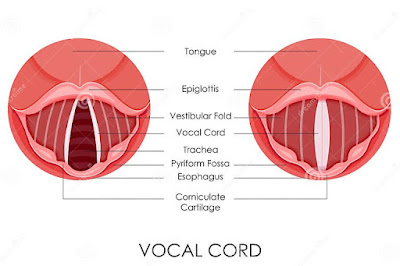How sound is produced while speaking?
| Sound |
We have a voice box know as larynx which is responsible for voice production
Larynx consist of vocal cord
Vocal cord has a vocal folds.... vibration of this folds produce sound know as phonation
 |
| Larynx consist of vocal cord |
 |
| Vocal cord |
Anatomically, the vocal cords are composed of layers of specialized tissue. The outer layer consists of a thin mucous membrane, while the inner layer is made up of three distinct layers: the epithelium, lamina propria, and thyroarytenoid muscle. The epithelium provides protection and lubrication to the vocal cords, while the lamina propria contains elastic fibers that contribute to their flexibility and vibratory properties. The thyroarytenoid muscle is responsible for controlling the tension and length of the vocal cords during speech production.
The vocal cords are attached to the arytenoid cartilages, which are small structures located within the larynx. These cartilages play a crucial role in controlling the movement and position of the vocal cords. When air from the lungs passes through the larynx, it causes the vocal cords to vibrate, producing sound. The pitch and volume of the sound are determined by the frequency and intensity of these vibrations.
The vocal cords can be divided into two main types: true vocal cords and false vocal cords. The true vocal cords are responsible for sound production and are located closer to the center of the larynx, while the false vocal cords are primarily involved in protecting the airway during swallowing and coughing.
Proper care of the vocal cords is essential to maintain vocal health and prevent damage. Factors such as hydration, smoking, excessive talking or shouting, and exposure to irritants can affect the function of the vocal cords. Injuries or disorders of the vocal cords can lead to voice changes, difficulty speaking, or other complications.
In conclusion, the vocal cords are complex structures within the larynx that play a vital role in speech production and airway protection. Understanding their anatomy and function is crucial for maintaining vocal health and overall well-being.